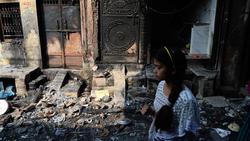 Iranian social media users have launched a campaign against India’s discriminatory measures targeting Muslims and the deadly acts of violence perpetrated by pro-government Hindu mobs towards the country’s largest religious minority.
Iranian social media users have launched a campaign against India’s discriminatory measures targeting Muslims and the deadly acts of violence perpetrated by pro-government Hindu mobs towards the country’s largest religious minority. RNA - They flooded the Instagram page of Indian Union Home Minister Amit Shah with comments on his latest post, decrying India’s brutal crackdown on the Muslim community.
In August 2019, the administration of India’s Hindu nationalist Prime Minister Narendra Modi unilaterally abrogated a constitutional provision that provided a semblance of autonomy to Jammu and Kashmir, India’s only Muslim-majority state.
Four months later, New Delhi passed a controversial citizenship law that is widely denounced as Islamophobic and a threat to the country’s secular constitution.
The so-called Citizenship Amendment Act (CAA) grants expedited citizenship to a bevy of non-Muslim minorities from India’s three Muslim-majority neighbors - Afghanistan, Bangladesh and Pakistan.
The Indian government is also seeking to update the National Population Register (NPR) and the National Register of Citizens (NRC), raising fears among India's 200 million Muslims that they could soon be marginalized and classified as illegal immigrants.
Iranians also took to Twitter to condemn India's anti-Muslim approach with the hashtag #WorldAgainstCAA.
Since the passage of the CAA in December 2019, Indians have held protests against the legislation, resulting in violent clashes that saw 75 people dead across the country.
Last week, the worst communal violence in decades took place in New Delhi, where at least 47 people were killed and more than 100 wounded.
Groups chanting Hindu nationalist slogans torched mosques and dozens of houses belonging to Muslim.
It came after a series of hate speeches by the ruling Bharatiya Janata Party (BJP) leaders, some of whom warned Muslims to wind down their peaceful sit-ins or face consequences.
United Nations High Commissioner for Human Rights Michelle Bachelet filed an application with Indian top court to join pleas challenging the CAA.
Academic and legal expert Faizan Mustafa told the Doha-based Al Jazeera broadcaster that the Supreme Court of India may end up hearing the UN application.
On Monday, Iran’s Foreign Minister Mohammad Javad Zarif took to Twitter to denounce “the wave of organized violence against Indian Muslims” and called for dialog as the best solution to the problem plaguing the South Asian country.
India summoned the Iranian ambassador to New Delhi afterwards to protest the comments. However, Pakistan’s Foreign Minister Shah Mahmood Qureshi supported Zarif, saying he “fully share[d]” the concerns expressed by “my brother."
847/940